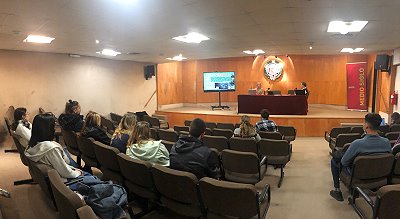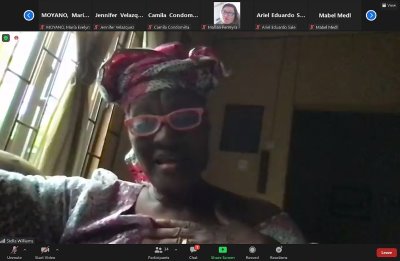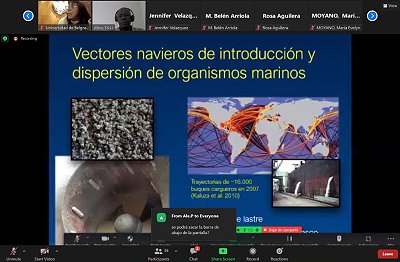 Every year we organise in Argentina, together with the University of Belgrano, an event to celebrate World Ocean Day. It always represents a new challenge, for various reasons. The first of these reasons is the topic itself: our Big Ocean and its much-needed care. And with this in mind, we invite the panelists, while motivating an audience increasingly afflicted by the misfortunes that our planet is going through, mainly the pandemic and the war in Ukraine, but also by other challenges of a more local nature. We must add that for the first time this event was developed in a hybrid way, that is, both in person (Buenos Aires) and remotely, with the public and panelists meeting on 10 June in both modalities, from Africa, Europe and America.
Every year we organise in Argentina, together with the University of Belgrano, an event to celebrate World Ocean Day. It always represents a new challenge, for various reasons. The first of these reasons is the topic itself: our Big Ocean and its much-needed care. And with this in mind, we invite the panelists, while motivating an audience increasingly afflicted by the misfortunes that our planet is going through, mainly the pandemic and the war in Ukraine, but also by other challenges of a more local nature. We must add that for the first time this event was developed in a hybrid way, that is, both in person (Buenos Aires) and remotely, with the public and panelists meeting on 10 June in both modalities, from Africa, Europe and America.

Prof. Stella Williams spoke to the participants from Nigeria, West Africa
This represented, at the same time, the challenge of coordinating the use of new communication technologies (ITCs) with the classic face-to-face activity. But the effort was worth it, since the enthusiastic panelists were able to share their recent discoveries, as well as their reflections, in front of a young audience eager for answers to the growing problems of pollution, climate change and overexploitation in our ocean.
In this way, in a framework of north-south and south-south collaboration, with the emphasis placed on the sustainable development goals of the 2030 Agenda, mainly the one referring to the seas, panelists and audience from three continents were able to exchange questions and answers, as well as reflections that will contribute to a better understanding of the challenges to be faced in a complex and rapidly changing world.
Prior to the development of the event, more than 260 registered people, mainly from Latin America, completed the quiz developed by students from the University of Belgrano. These answers will allow us to better understand, backed by analysing the statistics of the answers, the current vision that is perceived in this region of the planet about the situation of the seas and their state of health.
 The topics discussed during the webinar were quite diverse, from small-scale fisheries in West Africa to the principal routes of species introductions and their often invasive character, when they manage to establish themselves in the new environment without their natural predators.
The topics discussed during the webinar were quite diverse, from small-scale fisheries in West Africa to the principal routes of species introductions and their often invasive character, when they manage to establish themselves in the new environment without their natural predators.
Marcelo Morales Yokobori, Mundus maris Vice President and full professor at the University of Belgrano as key organiser of the event with his team of young collaborators thanks all participants and already looks forward to the next.
Der Welttag der Ozeane
2024
- Der Weltozeantag startet beim Brüsseler Umweltfestival am 2. Juni 2024
- Awaken New Depths, Veranstaltungen in Akure, Ondo State, Nigeria
- Wir feiern den Weltozeantag in Buenos Aires, Argentina
- Konzert anlässlich des Weltozeantages in Alcalá de Henares, Spanien
- Mundus maris feiert den Weltozeantag 2024 mit dem Ocean Summit in Kiel, Deutschland
- Rollenspiel in Kamerun
- Virtuelles Seminar zum Weltozeantag: Maßnahmen zum Schutz unseres Ozeans und Klimas katalysieren – Lagos ruft
- Fußball als Kommunikationsinstrument zum Meeresschutz
- Weltozeantag mit der Kawabata Yasunari Schule in Hann, Senegal
- Ausstellung „Rhythmen der Natur“ in Buenos Aires verleiht der Weltozeanwoche künstlerisches Flair
- Aufräumarbeiten an einem Bach in Hilden, Deutschland, wieder
2023
- Startschuss fuer den Weltozeantag in Hilden, Deutschland, am 3. Juni 2023
- Mit lieben Grüßen aus Buenos Aires
- So haben wir den Welttag des Ozeans 2023 in Lagos, Nigeria, gefeiert
- Weltozeantag in Kiel, Deutschland, mit Fokus auf dem Meeresschutz
- Handwerklich arbeitende Fischer in Hann, Senegal, bei den gemeinsamen Feierlichkeiten zum Welttag des Ozeans
- Auch Accra, Ghana, feiert mit
- Ozean-Aktivitäten in Braga, Portugal, erreichen am Welttag des Ozeans ihren Höhepunkt
- Grand Batanga Schule, Kamerun, feiert in Kribi
- Junge Leute in Akure feiern wieder mit Mundus maris, Nigeria
- Fußball zum Welttag des Ozeans im Senegal
- Konzert für den Ozean in Oostende, Belgien, 11. Juni
- Mundus maris asbl unterstützt die Veranstaltung zum Welttag des Ozeans 2023 auf den Kanarischen Inseln, Spanien
- The Book of the Marine World – celebrating World Ocean Day
2022
- World Ocean Day 2022 in Veracruz, Mexico
- All eyes on WTO in Hilden, Germany
- Clean-up along creek in Hilden, Germany
- World Ocean Week in Akure, Ondo State, Nigeria
- Webinar in Lagos for World Ocean Day 2022
- World Ocean Day in Kribi, Cameroon
- From Puerto Piramides, Argentina, to the World
- Beach clean-up by the soccer schools in Hann, Senegal
- VI Webinar World Ocean Day – Mundus maris/University of Belgrano – 2022
- World Ocean Day at the Kawabata Yasunari Primary School in Hann, Senegal
- Soccer tournament in Hann for World Ocean Day 2022
- A concert for peace and the ocean, Louvain, Belgium
